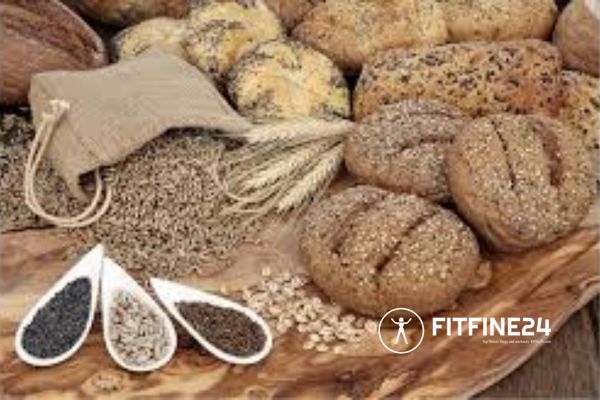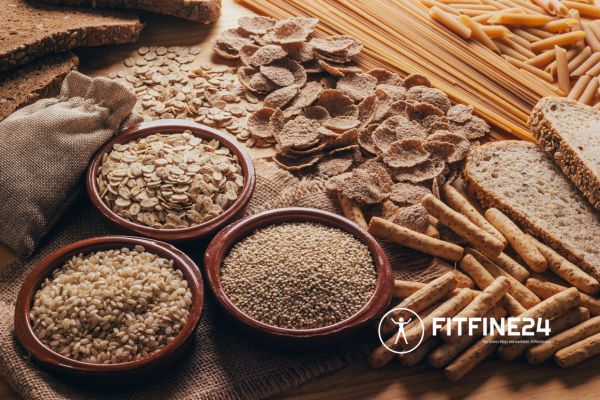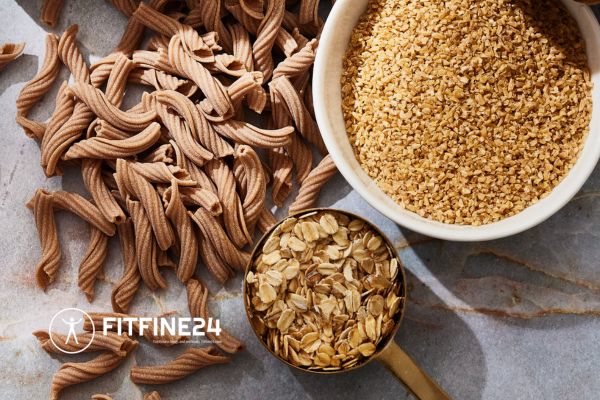
Whole grains dietare a nutritionally rich foundation for building dietary health, especially important for those focused on fitness and weight loss. Whole grains, unlike refined grains, are processed and minimally retain three parts of the grain kernel — the bran, germ, and endosperm — providing fiber along with other crucial nutrients like vitamins, minerals, and antioxidants.
Read on to find out why whole grains are good for fitness, how they enhance your workout, your heart and weight-loss diets, and tips to include them in your diet for better health.
What Are Whole Grains?
Whole Grain Diet are grains that have undergone the least amount of processing and still contain all their intrinsic portions. Whole grains examples
Brown Rice, Oats, Quinoa, Barley, Whole Wheat, Bulgar, Millet, Farro, Amaranth
While Refined grains are stripped of their bran and germ during processing, whole grains contain these nutrient-wealthy pieces which make them a healthy choice over refined ones.
The nutrient ranking of whole grains
A variety of nutrients found in whole grainscan also give your overall health -especially if you are an active individual- a big boost. One serving of whole grain (brown rice, quinoa — about ½ cup cooked) gives you:
Calories: 100-150
Carbohydrates: 25-35g
Protein: 3-6g
Fiber: 3-5g
Fat: 1g or less
Vitamins: B vitamins (thiamin, riboflavin, niacin), folate.
Nutrients: Iron, magnesium, zinc and selenium
Antioxidant Content: Phenolic acids, lignans, and flavonoids.
Complex carbohydrates, found in Whole Grain Diet provide sustained energy during workouts and are a good dietary source of fiber, which helps support proper digestive health and healthy weight maintenance.

Whole Grains Beneficial For Sports People And Everyone Else
Whole Grain Diet are slow-digesting, which means they exert a somewhat steady release of nutrients into the bloodstream. This is especially important for athletes and people training, as it allows them to keep going in duration exercise. Support your exercise routine Whether you are weight training, running, or doing high-intensity interval training (HIIT), whole grains stabilize energy levels which can impact both performance and recovery.
Promotes Heart Health
Whole Grain Diet are high in fiber, especially soluble fiber, and can lower bad cholesterol levels (LDL). This can reduce the possibility of heart-related diseases such as heart, hypertension, and other common health fears that a person living a sedentary life might suffer from. Consuming whole grains aids in cardiovascular health, especially in persons holding down stable occupations where physical activity is part of daily life and who exercise meter bar muscle regularly.
Aids in Weight Management
Whole Grain Diet assist in weight management, and there are several ways they help out. Because of the fiber in whole grains, these foods leave you feeling full for longer and prevent overeating. Also, whole grains have a lower glycemic index (GI), leading to a slower spike in your rise in blood sugar when eaten compared to that arising from refined grains. This eliminates the need for snacks and prevents the surge in glucose and insulin occurrence followed by subsequent falls responsible as a causal factor of overeating.
Aids in Muscle Growth and Recovery
Whole Grain Diet are rich in vitamins and minerals important for muscle growth and recovery. Take Magnesium for instance, important in both muscular inhibition and therefore critical for post-workout rejuvenation. Whole Grain Diet contain B vitamins that are important in converting food into energy, and while the protein content is minimal compared to animal sources — it still plays a role in muscle repair and recovery post-exercise.
Improves Digestive Health
Whole Grain Diet Aid in Digestive Health, High fiber This makes fiber extra special for newcomers to stools as it causes the waste to bulk, making it easier to pass and helps reduce constipation. 4 A proper functioning digestive system makes sure your body effectively absorbs all the nutrients from the food which is necessary to get fit or maintain a healthy lifestyle for that matter.
Lowers Chronic Disease Risk
Research indicates that a diet filled with whole grains is associated with a decreased risk of chronic diseases, such as type 2 diabetes, certain cancers, and obesity. Eating Whole Grain Diet can go a long way especially if you are on a fitness journey it can help in reducing these conditions and increase your overall health and performance.
Including whole grains in your healthy diet
Start your day with a breakfast built on whole grain to maintain steady energy throughout the day. For example oats, you can cook them as oatmeal, prepare overnight oats, or even add them to smoothies. Add fruits, nuts, and seeds to your oats for extra nutrients. Whole Grain Diet cereals or whole wheat toast with eggs or avocado are other breakfast ideas.

Pre-Workout Fuel
Possible pre-workout meal: Whole Grain Diet (quinoa, brown rice) + lean proteins (chicken, turkey, fish). The whole grains will provide you with the complex carbs needed when training for an intense workout and the protein supports muscle function, repair & recovery/Ayushman
Post-Workout Recovery
Whole grains: Whole Grain Diet help replenish glycogen stores that are likely to reduce post-exercise. Both whole grains and a bit of protein to help aid recovery. Or, do a quinoa salad and grilled chicken; or a brown rice stir-fry with tofu and veggies.
Snacks on the Go
Enjoying whole grains in a snack is super easy. One ounce of it (by weight) has about 110 calories-certainly much better, ounce for ounce than a lot of snacks out there, and lots of filling fiber. Whole grain bars are a great on-the-go snack and they make wonderful homemade granola for an easy snack of nuts, seeds, and oats with each eating.
Replace Seconds and Thirds with Whole Grains
Replace refined grains with whole grains, switching feces in your meal prep can be more easy. Replace white rice with brown rice or quinoa Get whole wheat pasta, not regular, and use whole grain bread for sandwiches. These little differences can go a long way in terms of your fitness and health further down the line.
Best Whole Grains for Fitness
Quinoa
Quinoa is considered a superfood as it is packed with protein and essential amino acids. It is an ideal source of complete protein for vegetarians and vegans. Quinoa: Contains magnesium, iron, and fiber to redress muscle soreness while enhancing energy production.
Brown Rice
Containing a balanced amount of carbohydrates, brown rice is ideal for fuelling workouts that last for long periods. It is also high in manganese which helps your body metabolize proteins and carbohydrates.
Oats
Whole Grain: Oatmeal is great, but oats can be enjoyed in the form of a smoothie or made into tasty treats that you bake. They are high in soluble fiber, which has been shown to lower cholesterol and keep you full . ideal for weight control.
Barley
Whole-grain barley is high in fiber and antioxidants, yet low to moderate on the glycemic index. It works as a great addition in soups, stews, or salads and is a natural pro-biotic that keeps your gut healthy all day long.
Farro
Farro is a nutty, flavorful ancient grain filled with fiber, protein, and antioxidants. It is a perfect canvas to build salads, grain bowls, or a side dish with a nutty taste.

What not to do with whole grains
A label may say that a food is made with whole grains, but this does not mean that it has not been refined and improved with added sugar, unhealthy fats, coverage, or some other types of harmful ingredients. Make sure the label says that whole grains are the first ingredient.
Overeating Whole Grains
Whole grains are okay, but you have to be aware of the amount. Each bite contains calories, and if you eat too much of a good thing, such as overeating whole grains you might lose control. Adhering to the recommended serving sizes of cannabis foods will prevent your workout plan from failing.
Opting For Flavored or Sweetened Whole Grains
Stay away from instant or flavored whole grain products, such as Maple & Brown Sugar-flavored oatmeal that usually include added sugars. Go for the plain ones and flavor them naturally with fruits, spices, or nuts.
Conclusion
Whole grains are a vital part of any fitness diet plan. Rich in nutrients, fiber, and antioxidants they provide lasting fuel for exercise, help with post-workout recovery, and promote heart health which can also assist in weight control. Whole grains constitute an excellent source of energy to help you achieve your fitness goals, and maintain overall wellness.
At fitfine24, we suggest including more whole grains in your daily diet. If you are going into a workout, accruing post-exercise or just looking to eat better whole grains have the nutrients for your body to deliver at max capacity.


1 Comment
Hello! I was thoroughly impressed by this blog post. Your depth of knowledge and ability to convey complex ideas in a simple manner is commendable. Thank you for shedding light on this topic. I’m looking forward to exploring more of your blog in the future.